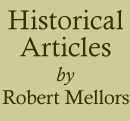The Lowe Family. The Lowe family of Highfield House, have rendered service. That house was built by JOSEPH LOWE, Esq., who was three times Mayor of Nottingham. His grandson, ALFRED LOWE, Esq., was very early connected with the Nottingham Mechanics' Institution, and was its Treasurer. In 1846 he taught the Vocal Music Class from which ultimately sprang the Sacred Harmonic Society. He died in 1856, aged sixty-seven. His son, EDWARD J. LOWE, was born at Highfield House, in 1825, and attained a prominent reputation as an astronomer, meteorologist, botanist, and scientist. He was a Fellow of the Royal Society, and his weather observations appeared daily in "The Times" newspaper. His son, MAJOR A. E. LAWSON LOWE, of the Royal Sherwood Foresters, commenced to publish a "History of the Hundred of Broxtowe", beginning with the History of Lenton, but it was not proceeded with.
John Wilmott. JOHN WILMOTT, an esteemed and honourable man, lived in the Manor House, was a Coach Proprietor, and had the last coach that travelled between Nottingham and Manchester. Mr. WILLIAM JOHNSTONE, a worthy man who for many years has resided in Lenton and and been a deacon of Park Hill Church, tells how that coming in 1844 from Scotland he took steamer to Liverpool, rail thence to Manchester, then coach from the Swan Hotel to the White Lion, Clumber Street, a twelve hours ride. The coach ceased to run about 1850.
John Froggatt and Thomas Shepperson. JOHN FROGGATT and THOMAS SHEPPERSON were useful members of the Leen DistrictSewerage Board, and the former was for some years a member of the Town Council. The Act of 1872 was an immense boon to Lenton, for the Leen had been the common sewer for the whole valley, and now an intercepting sewer carries the sewage to Stoke Farm.
John Wilkinson. JOHN WILKINSON was a yeoman, who for forty years devoted his time and attention to a very superior breed of pure short-horns. An engraving now in the possession of Mr. W. F. GRUNDY, dated 1815, shows the celebrated bull "Alexander," and other cattle. In 1854 the proceeds of one day's sale amounted to £2,000. and his bull calves have sold for one hundred and fifty guineas each.
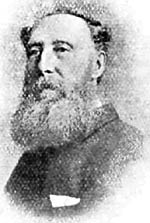
H. Farmer.
Henry Farmer. HENRY FARMER, who lived at Flora Cottage, Sherwin Road, and carried on business at High Street, Nottingham, was the conductor of the Nottingham Sacred Harmonic Society from 1866 to 1880, the composer of numerous musical pieces, and excelled as a violinist and conductor of oratorios. He simplified the musical compositions so as to come within the capabilities of the average performer. His instruction books on the various orchestral instruments were very practical and helpful. He was 40 years organist at High Pavement Chapel, and was a Captain in the Robin Hoods. He died in 1891. He was of a musical family, for his father, JOHN FARMER, was a celebrated glee singer; his nephew, JOHN FARMER, was the author of "Christ and His Soldiers"; and his niece, Mrs. BOWMAN-HART, was a well-known teacher of music.
William Musham. WILLIAM MUSHAM was a hosier, and for many years lived in Gregory Street. His special sphere of usefulness was that he devoted his Sundays to visiting Sunday Schools throughout the county. He for some years acted as Treasurer of the Bath Street Board Schools. He died in 1881.
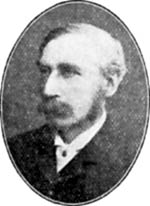
H. S. Wright.
The Wright Family. The Wright family have been of considerable service to the parish. Mr. JOHN WRIGHT, who built Lenton Hall, was buried at Lenton in 1840, aged eighty-two. FRANCIS WRIGHT, his son, High Sheriff, 1842, was the principal donor of the cost of building the parish church its schools, and vicarage. He removed to Osmaston, and was the senior partner in the Butterley Company. His sisters, the Misses FRANCES, CHARLOTTE, and ANNE, who lived in the house opposite to the Church, and died at advanced ages, were full of alms-deeds and good works. The Infant School was built by them. The Rev. HENRY WRIGHT became rector of St. Nicholas' Church, and a member of the School Board, and afterwards secretary of the Church Missionary Society. HENRY SMITH WRIGHT was one of the Mapperley family, and re-purchased Lenton Hall from Lord Middleton, to whom it had been sold. He was a useful Member of Parliament for Nottingham for nine years. He translated Virgil, as his father had translated Homer and Dante. He died in 1910, aged seventy-one. Mr. FRED WRIGHT, before his removal from Lenton, did much useful work in the parish.
The Rev. George Browne, M.A. The Rev. GEORGE BROWNE. M.A , was an active, earnest, and evangelical Vicar for forty-six years. He died in 1886, aged eighty-three.
Michael Browne. MICHAEL BROWNE lived in the "Crowner's House" in Gregory Street, and was the Coroner of Nottingham for fifty-five years. He died in 1891, aged ninety. He was a man of conspicuous ability and firmness of purpose.
John Renals and Sir Joseph Renals. Alderman JOHN RENALS, J.P., Sheriff of Nottingham, 1875, and Mayor 1888, and Sir JOSEPH RENALS, Bart., Lord Mayor of London, 1894, were twin brothers, born of an old and respected Lenton family.
Richard Cockrem. RICHARD COCKREM was an able and respected schoolmaster at the National School before he took holy orders, and at the time of his death he held a living in the North of England. Among his notable scholars at Lenton were the Rev. Oliver C. Cockrem, the present Head-master of the London Orphan Asylum, Watford, with degrees M.A., L.L.B., and L.L.D.; another scholar was the Rev. W. H. Finney, Rector of Ferry Bridge; others being Sir Joseph Renals, Bart., Alderman John Renals, Sir John Turney, Mr. Wm. Bridgett, J.P., the latter gentleman becoming a schoolmaster before entering the lace trade.
Sir James Lomax Bardsley. Sir JAMES LOMAX BARDSLEY, son of EDWIN BARDSLEY, of Lenton, was born at the south-west corner of Sherwin Road. He was appointed a Physician to the Manchester Royal Infirmary in 1823 (in succession to his uncle, Dr. SAMUEL A. BARDSLEY, who had served that office thirty-three years). He resigned office in 1814. He was the first Physician in Manchester to receive the honour of Knighthood. He continued his service to the Infirmary as Consulting Physician until his death in 1876. He was also Physician-Extraordinary to the Prince Consort.
The Bayley Family. ISAAC BAYLEY, before 1790, began the leather business at Lenton. THOMAS BAYLEY, brother of Isaac, in 1793, removed from Chester, where he had a school, to assist in the Lenton business. He conducted religious services in his house, and also acted as gratuitous pastor of Park Street Chapel, Nottingham. He died in 1835, aged eighty-four, and was buried in the Priory churchyard. He is described as a fine preacher, full of pithy sentences and proverbial sayings. He dressed in the old-fashioned way, with knee-breeches and brass buttons.
JOHN BAYLEY, son of the above, carried on the leather business, and also acted as gratuitous pastor at Park Street. He died in 1840, aged fifty-four, and was buried in the Priory ground.
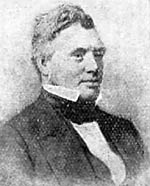
T. Bayley.
THOMAS BAYLEY, his son, continued and largely developed the leather business in conjunction with John Shaw. Of this business Mr. F. J. Bradley is now the head. He founded tanneries at Giltbrook and Newark, and other businesses elsewhere, as also the Digby Colliery Company. In connection with his various businesses he employed over two thousand men. He was one of the founders of the Lenton (now Nottingham) Co-Operative Society. For many years he devoted his Sundays to religious work,— preaching in the town or in the villages, and combining giving, sympathy, and work. He bought the Abbey Farm (probably a grange of the old Priory) from Lord Middleton in 1860. He died in 1874, aged sixty, and was buried in the General Cemetery.
JOHN BAYLEY, brother of Thomas, did a useful work in Lenton and Nottingham in the promotion of temperance, education, and social improvement. He went to New Zealand, where his family now are.
THOMAS BAYLEY, Junior, was an active promoter of unsectarian education. For nine years he represented Lenton on the Nottingham Town Council, and became Sheriff. On the formation of the County Councils, he was elected to represent Newthorpe, and was made an Alderman, a County Magistrate, and afterwards became Member of Parliament for the Chesterfield division, 1892-1905. Ho was a determined opponent of any form of slavery under the British flag. He died in 1906, aged fifty-nine. Mrs. BAYLEY was the daughter of Mr. Henry Farmer, and was active in benevolent efforts. There is a brass memorial tablet in Lenton parish church on which is this singular but striking inscription : —
"Man at her side Grew nobler, girls
purer, as through the whole town The
children were gladder that pulled at
her gown."
Miss BAYLEY founded the Nottingham Day Nursery and Beeston Orphanage, and has been occupied in other works of social public good.
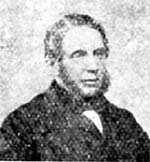
T. Adams.
Thomas Adams. THOMAS ADAMS lived from 1844 to 1873, at Lenton Firs, on Derby Road. He was born in 1807 at Worksop; at fourteen he was apprenticed to a draper at Newark, and after seven years' service he took a situation in London, and when about twenty-three years of ago commenced business as a lace merchant in a very small warehouse in Stoney Street, Nottingham. In 1830 he married Miss Lucy Cullen, and they had a family of ten children born to them. His character was developed by industry, frugality, fixity of purpose, sincerity, truthfulness, strong domestic affections, great liberality, and above all, the fear and love of God, carrying with it a deep sense of responsibility. Of course he had his imperfections and faults, like other people, and the last thing he would have thought of was to regard himself as perfect, for humility was one of his distinguishing features. In 1855 his firm—for there were nine partners—built the large and handsome warehouse in Stoney Street, and, his idea being that religion should accompany and guide business, a room in the warehouse was set apart for a chapel in which prayers were every morning offered in a short service commencing at eight o'clock, and this service he always attended, so leaving his house at fifteen minutes to eight. A Chaplain was appointed, and a letter was addressed by Mr. Adams to four hundred workpeople in which they were styled "Dear Friends," asking their cooperation, and the time spent in the service was at the cost of the firm. The workpeople heartily responded, and formed improvement classes, a penny bank, a medical aid society, and other means of promoting the reading of wholesome literature, piety, frugality, general culture, etc. His directions were, "Let the chapel regulate the business, and don't let the business extinguish the chapel. Let us give up everything which we cannot ask God to bless." Mr. Adams was very generous as a supporter of schools and churches. £500 was, about 1845, placed in the hands of the Bishop of Lincoln for the building or enlargement of St. John's, Trinity, and St. Mary's Schools, and it was then unknown that he was the donor. In 1870 he gave £500 towards supplying every district in Nottingham with school accommodation. £400 was given for a school site in the Poplar district, and £500 to what was then called a Free Church, afterwards St Stephen's, in a yard on Bunker's Hill, in order to provide for the poor of the district who would not attend a more public church. In conjunction with the Rev. J. W. Brooks, Vicar of St. Mary's, Col. Holden, Mr. F. B. Gill, and others, six new churches were built, and to St. Luke's he gave largely, and for twenty-five years there was not a church or school built in Nottingham to which he did not contribute (except All Saints', built by Mr. W. Windley). He inaugurated a scheme for six parochial Scripture readers, and was a large benefactor to Foreign Missions. In order to disguise his works he gave openly small subscriptions, and large ones anonymously, bis idea being that he was responsible to God to contribute according as God had prospered him. so he adopted the patriarch's rule, "Of all that Thou shalt give to me I will surely give the tenth to Thee." His personal public labours were also considerable, for he acted as a Justice of the Peace for both town and county; for many years he was a member of the Board of Guardians, and a member of the General Hospital weekly Committee, but withal he could never make a speech! He could work, and give, but not make a set speech. In the spring of 1870 his health began to show signs of giving way, but he continued his labours partially until 1873, when on May 16th he died, aged sixty-six, and was buried in the valley of rocks in the Church Cemetery. Ten thousand people attended the funeral, the parishioners of Lenton erected a memorial window in the parish church, and "Adams' Hill" is so named to his honour. His daughter. Miss Adams, continued as a useful parochial worker.
See "Religion and Business: Memorials of Thomas Adams," by the Rev. W. Milton. M.A., formerly Incumbent of New Radford.
There have been many men and women, quiet workers in their varied spheres, who may well be classed among the Worthies of Lenton. They have done their duty, served their generation, and are gone to their reward. Some in lowly stations, their names are not recorded, but they gave God and man their best, and their record is on high.
Changes. "Men may come and men may go," but the two rivers seem to say, "We go on for ever." What changes has that old Font seen since William Peverel placed it in the Church of the Priory eight hundred years ago ! The monks have departed, and the buildings have been razed, but a clearer view of faith, life, and duty has come. St. Anthony's Hospital has been closed, and his invocations on behalf of persons afflicted with erysipelas have ceased, but better systems of medical treatment, domestic nursing, and house sanitation have come. Illuminated missals are no longer locally produced, but more than 500 people a day attend at the Reading Rooms and Libraries, of whom 200 are boys and girls. No longer do kings come and reside in the guest-chambers, but the dwellings of the people are enormously better. The poor Leen, although clearer of late, has suffered, but pure water has been supplied to every house. The Peverel Court has been abolished, but a more considerate system of judicial administration has followed. The charity doles at the almonry door have ceased, but an industrious population earns its living by agriculture, manufactures, and in multitudinous other ways, while provision is made for the necessitous poor.
The train of pack-horses carrying on their backs coal from Wollaton, by Sutton Passeys through where the Park now stands, and down Sandy Lane to the Trent, pass no more, but the coal that God Almighty made and hid away, perhaps millions of years ago, is now being extensively won under— although not in—the parish. The coaches no longer run on the Derby Boad to Derby, Birmingham, and Manchester, and John Wilmott's Coach-yard is empty, but the two Canals, the Bailways, Telegraphy, Telephoning, Electric trams, Cycles and Motor cars, have followed in rapid succession. Norman rule, feudal laws, and serfdom have passed away, and although many evils still remain which only the grace of God and the sympathy of man can remove, yet many men have learned to rule and restrain themselves, by industry and thrift to earn their own living, to bring up their families in the fear of God, and the discharge of their duties, and to shout,
"OLD ENGLAND FOR EVER."
"Nought
shall make us rue,
If England to itself do rest but true."
